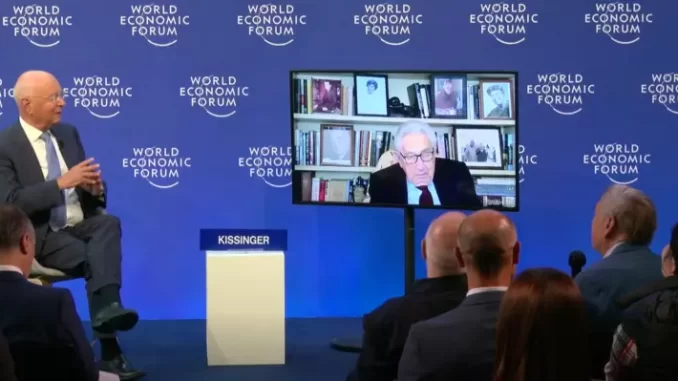
By John Friend
In a stark departure from leading U.S. politicians and pundits, former U.S. Secretary of State Henry Kissinger argued that a negotiated peace must take place between Russia and Ukraine and that the U.S. must seek to peacefully resolve issues with China.
Kissinger spoke with Klaus Schwab, the Founder and Executive Chairman of the World Economic Forum, earlier this week during the ongoing Davos 2022 meeting, an annual globalist confab attended by the world’s leading politicians and bureaucrats, journalists and pundits, academics and economists, and other top elites.
The conversation addressed the top geopolitical challenges facing the world today, with Kissinger focusing much of his commentary on the conflict in Ukraine and America’s relationship with China, two of the defining issues of our time.
Kissinger urged restraint against Russia and argued that the conflict has the potential to entirely reshape the global system as we currently know it. He implored both sides to come to the negotiating table to peacefully resolve the conflict.
“Parties should be brought to peace talks within the next two months,” Kissinger stated. “Ukraine should’ve been a bridge between Europe and Russia, but now, as the relationships are reshaped, we may enter a space where the dividing line is redrawn and Russia is entirely isolated. We are facing a situation now where Russia could alienate itself completely from Europe and seek a permanent alliance elsewhere. This may lead to Cold War-like diplomatic distances, which will set us back decades.”
Many American politicians and commentators, including Sen. Joe Manchin who also spoke at the Davos 2022 meeting and specifically rejected the notion that the war could be resolved with “some type of treaty,” have openly called for a total defeat of Russia – and even the removal of President Putin from power.
Joe Manchin, speaking today at the World Economic Forum, rejects the idea that the Ukraine war should ever be resolved with "some type of a treaty." Instead demands fighting "to the end," until total victory — which includes "getting rid of Putin" pic.twitter.com/wPj8qfsF1P
— Michael Tracey (@mtracey) May 24, 2022
Kissinger, on the other hand, argued that America and the West “should strive for long-term peace” and help resolve the conflict as soon as possible.
He insisted that the peace negotiations “will determine whether the combatants remain permanent adversaries, or whether it is possible to fit them into an international framework.”
He also explained that any escalation of the war outside of Ukraine, into a neighboring country like Poland for example, would transform the conflict “into [a war] against Russia itself,” which many American politicians and commentators appear eager to see happen.
Kissinger went on to comment on the historic role of Russia in European affairs, noting that Russia has always played a pivotal role.
“Looked at from a long-term point of view, Russia has been, for 400 years, an essential part of Europe, and European policy over that period of time has been affected, fundamentally, by its European assessment of the role of Russia,” Kissinger said. “Current policy should keep in mind the restoration of this role is important to develop, so that Russia is not driven into a permanent alliance with China.”
Since the initiation of Russia’s special military operation against Ukraine, which quickly prompted the U.S. and its NATO and European allies to enact a variety of economic, diplomatic, and cultural sanctions against Russia, the relationship between Russia and China has strengthened significantly, with Chinese officials insisting that Russia is its “most important strategic partner.”
Kissinger also commented on U.S. relations with China, which he helped initiate in the 1970s.
“Today, [China] is a powerhouse with significant economic and strategic interests,” Kissinger explained. “How the US and China conduct their relationship in coming years will depend on the patience and diplomacy of its leaders.”
He also noted that American diplomatic efforts, particularly with the Chinese, “must be sensitive, informed and unilaterally strive for peace.”
The Americans and Chinese clearly have a competitive and adversarial relationship, which has evolved over the years. That does not mean a peaceful, productive relationship cannot be pursued, according to Kissinger.
“The challenge is whether this adversarial aspect can be mitigated and progressively eased by the diplomacy that both sides conduct and it cannot be done unilaterally by one side,” the former Secretary of State explained. “So, both sides have to come to the conviction that some easing of the political relationship is essential because they are in a position that has never existed before – plainly, that a conflict with modern technology, conducted in the absence of any preceding arms control negotiations, so they have no established criteria of limitations, will be a catastrophe for mankind.”
He insisted that a “direct confrontation” with China “must be avoided” and that “Taiwan cannot be the core of the negotiations between China and the United States.”
“For the core of the negotiations,” Kissinger continued, “it is important that the United States and China discuss principles that affect the adversarial relationship, and that permit at least some scope for cooperative efforts. The Taiwan issue will [not] disappear, but as the direct subject of confrontation and adversarial conduct it is bound to lead to [a] situation that may mutate into the military field, which is against the world interest and against the long-term interest of China and the United States.”
Watch the entire conversation below:
